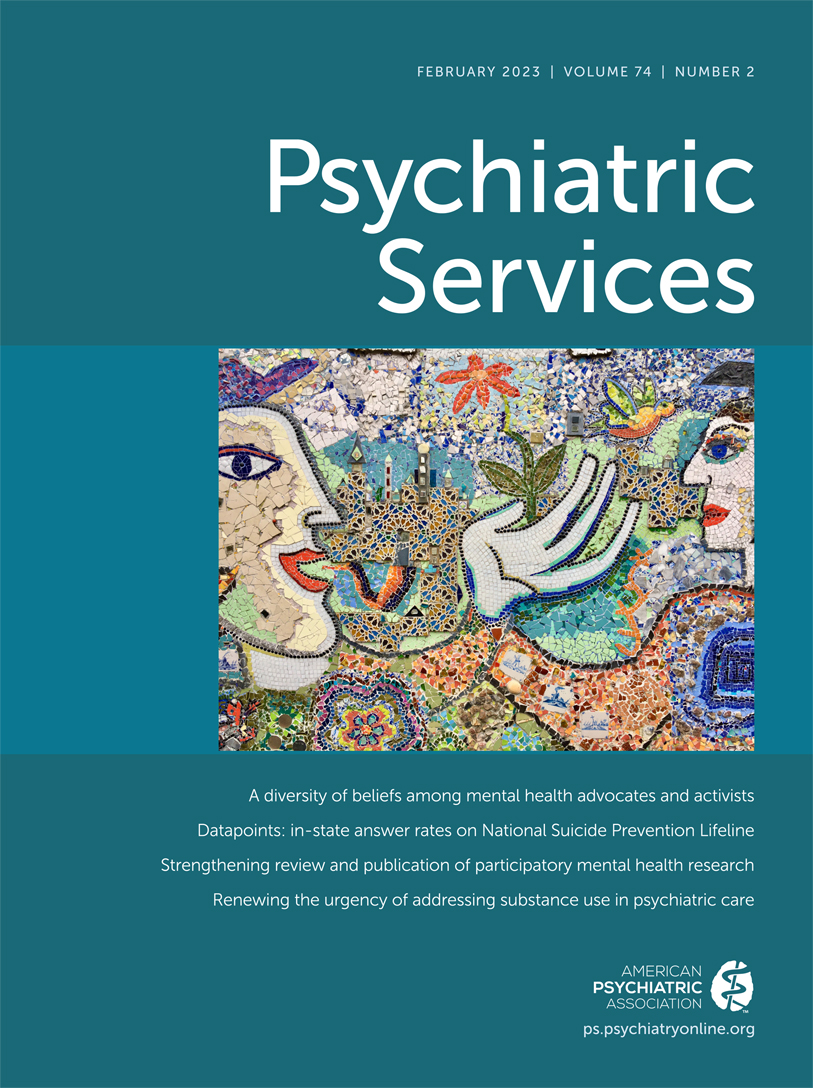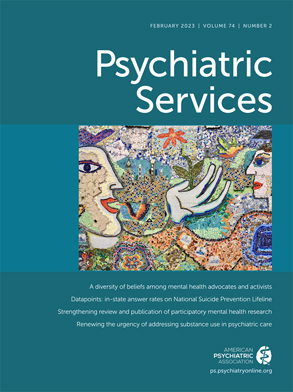Substance use disorders and mental disorders frequently co-occur and can exacerbate one another. Approximately 18% of U.S. adults with a mental disorder also have a substance use disorder, and approximately 38% of U.S. adults with a substance use disorder also have a mental disorder (
1). Yet the segregation of mental health services and addiction services remains common (
2). Only 6% of U.S. adults with co-occurring mental and substance use disorders receive specialty care for both disorders (
3), and mental health and substance use services are often provided in primary care settings by clinicians who may have limited training in these areas (
4). Although a range of policy approaches is needed to better integrate consideration and management of substance use into psychiatric services (
2), the field of psychiatry must also undergo considerable changes to achieve these goals. This Open Forum explores factors within the field of psychiatry, including insufficient training related to substance use, prevalent stigma toward substance use, and limited availability of clinicians specialized in treating patients with co-occurring mental and substance use disorders, that reinforce this divide and offers solutions for better addressing substance use in psychiatric care.
Insufficient Training Regarding Substance Use
Patients with mental disorders often discover that their outpatient or inpatient psychiatrist either cannot (e.g., restrictions on prescribing medications for opioid use disorder) or will not (e.g., lack of addiction training) fully address substance use, including treatment for co-occurring substance use disorders, when providing care (
5–
7). Yet addressing substance use is critical to recovery in psychiatric care. For example, among Canadian patients with opioid dependence and schizophrenia, periods of adherence to methadone were associated with twice the subsequent likelihood of adherence to antipsychotic medications (
8). Likewise, medication for alcohol use disorder among those with co-occurring serious mental illness and criminal legal involvement has been associated with decreased risks for psychiatric hospitalization and emergency department visits and increased adherence to other psychiatric medications (
9). Despite these promising results, psychiatric training programs often provide only brief rotations in addiction treatment services and do not train emerging clinicians to adequately care for these patient populations. Many psychiatrists receive little to no training in substance use treatment strategies such as motivational interviewing or medications for addiction treatment (MAT) (
10). For instance, just 16% of U.S. psychiatrists had a waiver enabling them to prescribe buprenorphine in 2012 (
11), and a 2021 article (
10) noted that addiction-related training requirements represented just 2% (1 month out of 4 years) of psychiatry residency. Because of psychiatrists’ limited training regarding substance use, including assessment and treatment of substance use disorders, patients may be misdiagnosed, receive inadequate care, or have to seek out additional specialty addiction clinicians to adequately address their treatment needs.
Stigma Toward Addiction in Psychiatry
Stigma related to substance use is prevalent among health professionals (
12), further reinforcing the divides between addiction and mental health services. For example, psychiatric providers may view patients with substance use disorders as being more “difficult” to treat, less likely to improve clinically, or more likely to manipulate providers for secondary gain (e.g., medications) (
12). In a survey published in 2013, 74 (47%) of 157 U.S. psychiatrists indicated that drug addiction resulted, to some degree, from moral failings, and 64 of 153 (42%) answered similarly for alcohol addiction (
13). Because of these stigmatizing attitudes, U.S. psychiatrists may be less likely to explore substance use with patients, to diagnose substance use disorders, and to arrange for appropriate substance use treatment.
Limited Availability of Co-occurring Disorder Specialists
Patients with co-occurring mental and substance use disorders often receive little or no treatment (
3); however, those who do seek care often receive care from primary care clinicians who may feel uncomfortable providing advanced mental health or substance use services (
4) or from mental health professionals who feel uncomfortable providing substance use services. Addiction psychiatry, a subspecialty supporting the development of specialists with expertise in substance use and mental health, has existed for several decades (
7). Yet, as of the 2020–21 academic year, there were 92 current fellows in addiction psychiatry programs (
7), and many existing addiction psychiatrists leave the field because of retirement, pursuit of other interests, or other factors; of diplomates certified in addiction psychiatry since 1993, just 45% were active in 2020 (
14). Taken together, the limited numbers of addiction psychiatrists currently in training or remaining within the field (
7) indicate this training pipeline, although essential, cannot alone meet the needs of the millions of people in the United States with mental disorders who use substances or have substance use disorders.
Overcoming These Barriers
The barriers to routine integration of substance use into psychiatric assessment and treatment practices span many layers, and one-size-fits-all solutions will likely not adequately address these issues. In 2022, Minkoff and Covell (
2) described several policy approaches, including communicating goals to service providers, developing state-level steering committees, using performance improvement standards, and collaborating with partner systems (e.g., criminal legal and housing), among other approaches, to more broadly integrate services for people with co-occurring mental and substance use disorders. Additional approaches that specifically focus on psychiatric training and practice are essential for bringing awareness and treatment practices related to substance use to the center of psychiatric care.
First, it is critically important to expand general psychiatric training related to the full spectrum of substance use, including substance use, substance misuse, and substance use disorders (
15). All psychiatrists should be expected to achieve universal standards of competency in best practices related to substance use, such as screening, consideration of co-occurring disorders, early intervention strategies, motivational interviewing, and use of MAT (
2,
10,
16). For example, even though 1 month of addiction-related training is required during psychiatric residency, training experiences can vary widely among programs. According to a 2017 survey, approximately 60% of programs did not require residents to complete buprenorphine waiver training, and 46% of programs did not have a formal curriculum dedicated to addiction (
6). Greater exposure to the care of people with co-occurring mental and substance use disorders, whether by offering additional elective rotations in addiction treatment settings, requiring residents to obtain buprenorphine waivers, or creating partnerships with addiction psychiatry fellowship programs, can better equip the psychiatric workforce to recognize, treat, and advocate for these types of patient populations. Formalized training in clinical and didactic contexts could not only deepen psychiatrists’ expertise in these areas but also widely ingrain the consideration and management of different types and severities of substance use in psychiatric practice.
Second, efforts to reduce stigma toward substance use and substance use disorders among psychiatrists, such as education programs and contact-based training for medical students and residents, are needed (
17). Reframing addiction as a chronic brain disease—for example, by promoting awareness of the factors, which are often beyond a person’s control, that make certain people particularly vulnerable to addiction, such as genetic, developmental history, and social factors—has been offered as one approach (
18). These approaches might be used in the classroom setting, yet greater real-world exposure to people with lived experience with substance use disorders may be one of the most powerful ways to combat stigma among psychiatric trainees (
10,
17). For practicing psychiatrists who are out of training, additional efforts, such as updating terminology in continuing medical education activities to less stigmatizing language and highlighting misperceptions about addiction, are also necessary to combat negative attitudes toward these patient populations. Offering adequate compensation, such as financial incentives, may be another structural approach for combating psychiatrists’ hesitancy to work with these patient populations. At present, psychiatrists may have little incentive to spend extra time undergoing training and discussing treatment options related to substance use; for example, providing an antidepressant to someone with co-occurring depressive and substance use disorders may seem more straightforward than delving into the individual’s complex substance use history, considering the role of MAT, or pursuing motivational interviewing during a clinical encounter (
19). Developing models of care, whether through insurance reimbursements or program-based incentive payments, such as billing changes or block grants from state departments or the Substance Abuse and Mental Health Services Administration (
2), can offer structural incentives for psychiatric clinicians to more readily address substance use, including substance use disorders, among their patients.
Third, investing in specialty addiction training pipelines could not only help address shortages of co-occurring disorder specialists but also raise awareness across medical specialties about the role of substance use in shaping mental health and broader health-related outcomes. Alongside the development of the field of addiction psychiatry, health professionals have also begun pursuing certification in addiction medicine, a separate medical subspecialty, with growing numbers of diplomates (
14). These two subspecialties have considerable overlap, and psychiatrists can become addiction medicine specialists as well; however, addiction psychiatry training may place additional emphasis on the treatment of co-occurring mental and substance use disorders, psychotherapeutic techniques (e.g., cognitive-behavioral therapy), and psychopharmacological management strategies. Continued efforts are needed to build collaborations between these two subspecialties and to expand training and expertise in the management of co-occurring mental and substance use disorders across both disciplines (
14). Examples of collaboration include pooling resources across departments to support funding fellowship programs, creating mutual rotation opportunities to enhance addiction expertise in psychiatric and general medical settings, and developing interdisciplinary didactic curricula to foster more diverse learning experiences (
14).

